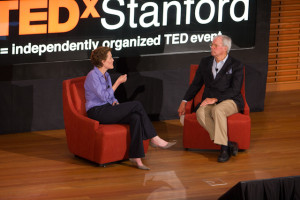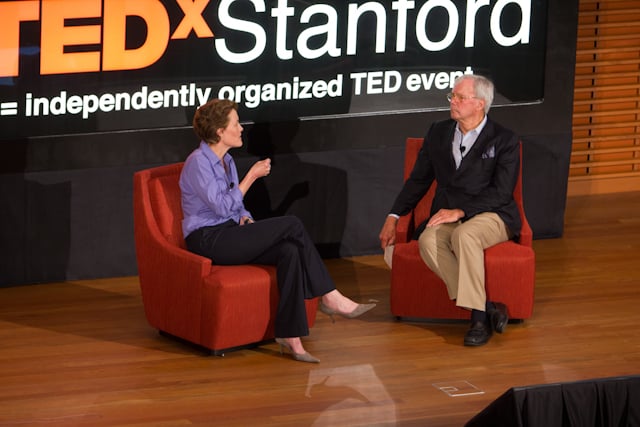Peabody Award-winning journalist Tom Brokaw and his daughter Jennifer Brokaw ’88, the founder of Good Medicine, a private medical practice serving the Bay Area, appeared at Saturday’s TEDx Stanford conference, speaking frankly and honestly on the subject of end-of-life health care options.
Tom Brokaw began the dialogue, framed as a conversation between father and daughter, by asking the audience to ponder the reason to have such conversations.

“You are not expected to know, but you are expected to wish to know,” he said, quoting the late Yale president Bart Giamatti.
The father-daughter pair dove straight into the matter at hand, describing death as “the greatest certainty we will ever have to face.” Jennifer Brokaw discussed statistics demonstrating that most American families are ill-prepared to deal with living wills or situations in which a family member is no longer able to make decisions for himself.
“Only 30 percent of people have a living will…and those who do are in a position to leave their families better off emotionally and financially,” she said.
During the talk, Brokaw asked her father what his wishes would be if he were ever in a state where he could not communicate them to a doctor.
“I’m a realist, and so I never want there to be any heroic efforts to keep me alive if I am confined, am immobile or cannot communicate with the ones I love,” he said.
Brokaw chided her father for his lack of specificity to illustrate that directives for such conditions must be exceptionally precise.
“When families and doctors take some enormous decisions on behalf of others, they need to make sure they are acting in line with the priority of their loved ones,” she said.
Only 50 percent of terminally ill patients have some advanced directives prepared, she said. Moreover, of those 50 percent, only 12 percent had prepared the directives through consultation with a physician. The remainder wrote them with a lawyer. This, she argued, represents “a crisis in healthcare” as decisions that few are equipped to deal with are falling into the wrong hands.
She praised the United States’ “superb and technologically advanced health care system” but critiqued its structure.
“Super-specialization means we end up talking to a lot of -ologists,” she said.
She added that, as a result, important discussions with physicians who have a holistic knowledge of their patients occur less frequently.
The conversation included a series of anecdotes intended to illustrate different aspects of life and death and the medical care that can sustain the former. The duo also elaborated on the financial angle of the matter, explaining the enormous burden of full-time medical assistance and saying that in some cases people sell off assets to cover $100,000 to $300,000 per year in healthcare costs.
“There is a lot of reengineering of our health care system that needs to take place,” Jennifer Brokaw said. “We have to ask ourselves: how do you add life to your years instead of years to your life?”
Speaking to The Daily, she explained that the idea for the talk came from personal experience.
“In my own family, my father is starting to deal with his relatives who are near the end of life, and it got him thinking about his own stage of life, and what he wants for himself,” she said.
The initial invitation to the conference was for an entirely different type of conversation, but the two Brokaws said they were happy to address end-of-life care, an issue they said should not be the taboo subject that they believe it is.
Tom Brokaw said he felt no hesitation discussing personal details with a large audience despite the subject matter.
“In the family, we put everything on the table,” he said. “And given how instructive speaking to my daughter was when my mother was passing away, I felt that talking about this issue was almost journalistic for me.”
